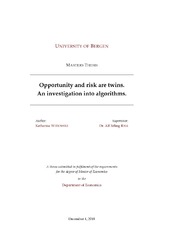| dc.description.abstract | Algorithms will free up people’s time to do other things, much like computers have freed people from paper calculations. The depth and breadth of the application of algorithms is best understood through a task-based automation model. An algorithm cannot replace all of the duties of a certain, perhaps even cognitively taxing job; however, an algorithm can be used to automate many of the so-called individual tasks. Their ability to replace physical tasks is more limited. An algorithm can also be used to perform certain tasks to a higher quality in a shorter period of time than a person. Algorithms may globally become the ultimate productivity boost for advanced economies. Hence, it is recommended that people learn to work with algorithms, instead of against them. In addition, by combining human creativity with algorithmic power, a new era can be ushered into existence. . . . | en_US |
